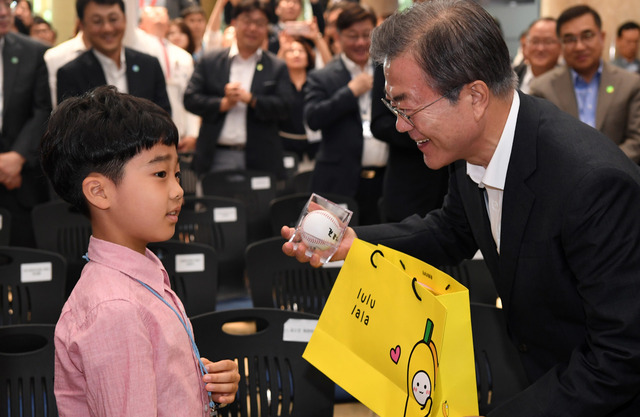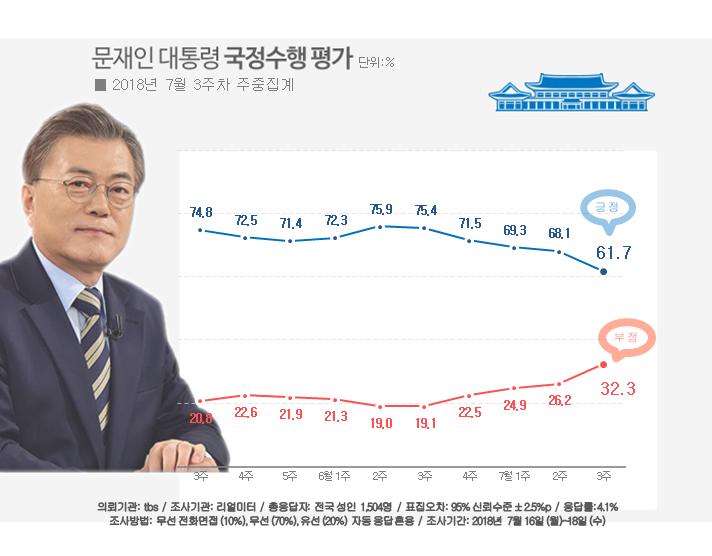Posted on : Jul.20,2018 15:46 KST
Modified on : Jul.20,2018 15:57 KST
 |
|
Caption: South Korean President Moon Jae-in offers a baseball to a child suffering from diabetes at Seoul National University Bundang Hospital’s Healthcare Innovation Park, a center for biotech research, on July 19. (Blue House photo pool)
|
South Korean President Moon Jae-in’s approval rating has been falling for five weeks in a row since the local elections on June 13. The approval rating announced by polling organization Real Meter on July 19 showed Moon with an approval rating of 61.7 percent, down 6.4 points from the week before. This was the biggest decrease since his inauguration. It was also the lowest his approval rating has been since it dipped to 60.8 percent in January because of the controversy over the unified inter-Korean team during the Pyeongchang Winter Olympics. At this rate, Moon may find it difficult to stay above 60 percent. The approval rating of the ruling Democratic Party also dropped 3.8 points to 41.8 percent, continuing a five-week decline.
 |
|
President Moon’s approval ratings as demonstrated by the results of a survey of 1,504 South Korean adults conducted by polling organization Real Meter on from July 16 to 18. (Real Meter website)
|
The decline in Moon’s approval rating appears to be largely due to the recent economic circumstances, exemplified by the debate over the minimum wage. The intensifying controversy over the efficacy of “income-led growth” and the growing severity of the job market were compounded by the minimum wage debate. When respondents in a Gallop Korea poll last week in which Moon’s approval rating fell to the 60 percent range were asked why they disapproved of Moon, the most common answer, at 45 percent, was that not enough had been done to solve issues with the economy and the public livelihood.
This trend may well be normal for a president in his second year in office, and it is possible to conclude that his approval rating has finally settled into normality. Moon’s high approval rating, which had mostly remained above 70 percent until this point, was largely based on his personal appeal, as well as his diplomatic successes, including progress in inter-Korean relations. According to Gallop Korea, Moon had an approval rating of 75 percent during the first quarter of his second year in office, higher than any other South Korean president in history. It would not be realistic to expect such an unusually high approval rating to continue for the duration of Moon’s presidency.
That said, Moon and the ruling party should not take the recent drop in their approval rating lightly. Whereas the approval rating had generally depended on Moon’s individual ability until now, we appear to have reached a point where it will be more deliberately assessed according to the ability of the group in power. If the current lackluster performance in the areas of the economy and the public livelihood continue, the potential consequences are unpredictable.
There are several senses in which the Moon administration appears to have been brought into a new phase through the June 13 local elections. The dedicated supporters who pushed Moon to victory first in the presidential election and then in the local elections are now expecting Moon to bring them concrete policy results. The current mood appears to be that while Moon has partially met expectations in the areas of foreign policy and security, it is still unclear whether he will manage to improve the people’s quality of life. There’s no need to get worked up over fluctuations in the approval rate, but the government and the ruling party need to seriously reflect upon the significance of the recent downward trend. It’s time for an attitude change: the party needs to stop reveling in its victory in the local elections and start paying attention to the public’s demands.
Please direct comments or questions to [english@hani.co.kr]










